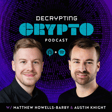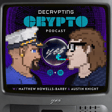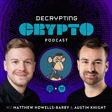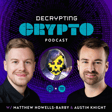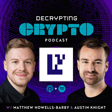Become a Creator today!Start creating today - Share your story with the world!
Start for free
00:00:00
00:00:01

Off Chain 2/8/24: Staked ETH ETF? AI Passing KYC, and the Ethereum Dencun Upgrade
In this week's episode we cover:
- Ark 21shares amended its spot ETH ETF filing to include a cash creation/redemption process (similar to spot BTC ETFs) and some language surrounding staking.
- A look at the underground site where basic AI is being used to bypass KYC and AML.
- Ethereum's Dencun upgrade reaches the final stages of testing, going live on the Holesky testnet, paving the way for it to hit the Ethereum mainnet in late Feb or early March.
Transcript
Introduction & Bitcoin Market Status
00:00:12
Speaker
Hello and welcome to the Decrypting Crypto Podcast. It's February 8th, 2024, and this is Off Chain, your weekly recap of the biggest stories in the crypto space. I'm Matthew Housebarbie, and as always, I'm here with Austin Knight. How you doing, Austin? Doing well, Matt. We are not quite at our 70K Bitcoin prediction that we made late last year, but we are hovering around the 45K mark, which is better than a couple days ago, I will say.
00:00:40
Speaker
It certainly is. As every day goes by, I'm building up more and more conviction towards that elusive all-time high.
Bitcoin Halving Trends & Predictions
00:00:51
Speaker
I actually saw on Twitter, I think it was the Milk Road that published this, they had the past three Bitcoin harvings and they showed 90 days prior to the halving and the price of Bitcoin. The price of Bitcoin at the time of the halving and then the price of Bitcoin 90 days after the halving.
00:01:11
Speaker
And if you want some, if you want to feel great and feel bullish, look at that chart, because I'll tell you, it looks good. So typically like what we've seen in every single halving actually, the run up to the halving actually is very underwhelming. And I think you got like miners that are typically like selling and capturing some profit before like the halving event happens. And then pretty much every time we've seen like a local all time high,
00:01:37
Speaker
is 90 days after the the halving event so i'm strapping in ready i'm uh i'm gearing up for that big wonderful 70k plus btc enda q3 starter q4
00:01:53
Speaker
early holiday present, let's go. It's going to be like, you know, you're going to be there at Thanksgiving and people are going to be like, Austin, you're so rich. Why didn't I listen to you? Like, I feel like a dumbass. Why did I buy Tesla stock and not just buy Bitcoin? Damn it. And you'll be there in your Lambo parked outside. It's going to be magical. It's going to be the best thing ever.
00:02:13
Speaker
Matt, I have to confess, it'll be the third Thanksgiving in the last seven or eight years where that has happened. And it has always been followed by a Thanksgiving where I had a Toyota Corolla parked in the driveway.
00:02:29
Speaker
Well, you know, who knows? As we always say, this time it's different, right? You know, it'll be a reason. Exactly. All right.
ETH ETF Filings & Market Impact
00:02:38
Speaker
We've got some really interesting stories to dive into today. Should we get into it? Let's do it. We're going to be talking about the ETH ETF filing and some really exciting changes that are happening on that front.
00:02:50
Speaker
diving into the deep dark world of AI and also some more positive news about the state of Ethereum. It's a lot of like positive ETH news that we're going to be sharing today. So without further ado, let's dive straight in.
00:03:13
Speaker
The ETH ETF filings have been well underway and we've had a few delays. Yesterday was the latest delays from the SEC on some of the, a couple of the different companies that have filed for spot ETH ETFs, but something much more interesting happened.
00:03:36
Speaker
ARC21 shares, which obviously has their spot BTC ETF, are also filing for an Ether ETF. But they made some changes to the filing. And one of those was just to include a cash creation and redemption process, which is pretty similar to the BTC ETF. So it looks like that's going to be the same requirement.
00:04:02
Speaker
but what was very interesting is they added some language surrounding staking now
00:04:10
Speaker
The reason why this staking language is really interesting, at least in my opinion, is because it's something I've personally been wondering of whether we would start to see in some of these filings, or maybe a fingers crossed post eth spot ETF filing would start to see like a staked eth ETF. So what they're proposing here,
00:04:35
Speaker
is that they would be allowed to stake some of the ETF's underlying ETH. They didn't mention whether the staking proceeds would actually be passed on to ETF holders, but if they did,
00:04:52
Speaker
this would make for a pretty extremely compelling and first of its kind yield-bearing crypto spot ETF.
Yield-bearing ETH ETFs & Institutional Appeal
00:05:03
Speaker
So you may be familiar with like some of the different dividend ETFs, right? Where largely it's a basket of stocks that provide pretty consistent and healthy dividends and those dividend incomes that are received
00:05:18
Speaker
into the ETF are then distributed to the ETF holders. It's nice, yield bearing, wonderful.
00:05:29
Speaker
This would be pretty amazing from an ETH perspective because not only are you able to get upside in exposure to ETH via an ETF product, which certainly in the US comes with some nice tax advantages, but it'd be yield bearing as well. So it'd almost be like being able to stake ETH without managing the custody, et cetera.
00:05:52
Speaker
Now, before you all get excited and start 100x leveraging ETH, this all comes with some big caveats. So this additional text that's written in the file, in the amendments that have been made, they're all written within parentheses. And what that typically indicates
00:06:13
Speaker
is that they're actually yet to engage the SEC about its edition but they're kind of saying this is something we would like to include. So we could and maybe likely we see this language removed completely after the discussions but if not,
00:06:32
Speaker
This paves the way for a staked spot ETF, which personally I think is an incredibly exciting financial instrument. And as someone who regularly is exposed to institutional investors,
00:06:51
Speaker
Let me tell you this, this would be very, very appetizing for the institutional investors out there that can't have kind of self-custodied access. I mean, there is a huge amount of
00:07:07
Speaker
uh qualified custodial eth staking services out there that generate a very significant amount of money and have significant assets and the management that are exclusively um focused on institutional investors this
00:07:23
Speaker
is probably even more appealing to many of them. So I think it's super exciting. I love that we're starting to see some of this. Do I believe that this will be in the final approved Arc 21 shares Ether ETF?
00:07:40
Speaker
No, I don't. But I'm glad that we're starting some of these conversations because if we do see that, hopefully, mid-May, the ETH ETF is approved, which is definitely nowhere near as straightforward as the BTC one,
00:08:01
Speaker
Then I think we start to have the narrative shift towards the stake to ETH ETF, which is a bit of a mouthful to say. I will say that, but we'll be a really cool product and be very good for ETH as a whole after what would likely be the inevitable grayscale ETH-E sell-off that we've seen in the same sense of the grayscale GBTC sell-off, which has now finally started to slow down, which is a least good thing.
00:08:32
Speaker
Matt, what does this mean? This is exciting in one respect because it really improves the accessibility of eth staking, right? Like you said, to institutions,
ETFs Additive to Crypto Exchanges?
00:08:43
Speaker
to investors that maybe are taking more traditional paths to investing. What does it mean for crypto exchanges, though? It makes me think of Coinbase's mission of bringing crypto to the masses, being a real consumer product, an interesting
00:09:01
Speaker
function that they offer is that you can stake ETH if now in order to have exposure to really the crypto that the majority of people want exposure to which is the big ones through ETFs and then you can even have a state
00:09:18
Speaker
spot ETF. What's the reason for your average person to go to a user-friendly crypto exchange at this point? Does it sort of become relegated to just like crypto natives at that point? So I think that there's a few layers to this. So first of all,
00:09:40
Speaker
you, there's a few layers underneath the ETF, right? So you'll have, for example, ARC-21 shares, right? You'll have, alongside ARC, you'll have BlackRock and all the others. And let's say they all have this staked ETH ETF. Well, first of all, they need a qualified custodian, someone to, if it was just a spot ETH ETF, you know, they need a central exchange, whether that be a,
00:10:08
Speaker
Coinbase or Kraken. Well, it's not going to be one answer, right? But like all of these others, right? They need a place to both buy the underlying ETH to support the holdings and back the holdings of their ETF. And they need a place to actually like custody that ETH because they're not doing themselves outside of where Fidelity has been doing that with their Bitcoin spot ETF.
00:10:35
Speaker
Then if we get into the layer of staking, well, you know, someone needs to stake this ETH, someone needs to run the validators. And this is where you get into the institutional grade staking services. Like I can speak for a Kraken, like we have this, we acquired a company called Stake, which is an institutional like ETH and many, many other
00:11:04
Speaker
cryptocurrency staking product and we have and spin up validators on behalf of our clients to actually like you know really stake the ETH and push back the rewards etc that then would be funneled in some in some way to an ETF which would all be ran through some kind of like index right like for the majority
00:11:27
Speaker
It's like CF benchmarks do this for BTC. So the role of the crypto exchange, this is very, like, I think people often lose sight of it. This is very bullish for the crypto exchange. And also actually in this case, not just exchanges, but a lot of the like institutional grade staking and custody providers, because they're going to be the ones servicing all of this. For the average user,
00:11:57
Speaker
I don't know how much things change, per se. Obviously, there's just going to be a lot more liquidity, but in ETH and BTC, you're always going to get that anyway. But I think maybe what we start to see that I think would be beneficial with something like this is maybe a little bit more clarity on staking products as a whole.
00:12:18
Speaker
not been the easiest thing to tackle in the US in particular. And it is a lot more of a gray area from a regulatory standpoint. I think this could push that a little further along and we get a little bit more clarity there.
00:12:33
Speaker
But I don't really think many things change per se. I still think that the people buying a lot of this will largely be the institutional investors. I still think that retail users will go in and stake via central exchanges in the same way that I still think people will do it via DeFi as well.
00:12:57
Speaker
I hope that changes. I hope more people self-cost and become and run validators and things like that in the future. But for most people, that's not what they're going to do. But I think it's a good thing for the whole of the wider crypto industry. And make no mistake, it's very good for exchanges and custodians as well.
00:13:20
Speaker
So because of these interdependencies between the institutions and the exchanges, this is maybe more additive than it is competitive. Would that be fair to say? Absolutely. And that's what is absolutely the case with the Bitcoin ETFs, right? Because, you know, the reality here is that
00:13:46
Speaker
The ETF providers are just another big customer. If they're taking in...
00:13:57
Speaker
$200 million worth of inflows on a single day of Bitcoin, like BlackRock did in the first few days, they got to buy $200 million worth of Bitcoin. And where are they going to do that? Well, the only place they can do that in central exchanges that both have the liquidity to do that, largely all through OTC kind of markets and offerings that they'll have specifically for that.
00:14:26
Speaker
they can store them within qualified custody products, which they are required to by law. So I think that's kind of the piece here. It is absolutely additive and not competitive. Maybe you could make an argument that it's somewhat competitive on the institutional side, but I don't agree with it. I think it's completely additive. It's exciting. I love it. Absolutely. Yeah, it's going to be really cool to see where this one plays out.
00:14:57
Speaker
Um, I, I, I'm probably at the 60% confidence that the ETH spot ETF gets approved, um, right now. And, you know, when we were talking back in, uh, when was it November, early December of the BTC?
00:15:19
Speaker
spot ETF I was like 98% sure right like so much less conviction on this one but if it does it'll be a it'll be a big win but let's dive into the next story of the day
OnlyFake Introduction & KYC Bypass
00:15:35
Speaker
Let's take a look at an underground site where pretty basic AI is being used to bypass KYC Know Your Customer and AML anti-money laundering measures.
00:15:50
Speaker
We've talked a lot on this podcast about KYC and AML. These are measures that exchanges, financial institutions, etc, etc, have to put into place by law to validate the individual that is
00:16:09
Speaker
participating in transactions. So like if you've ever signed up for a crypto exchange, you may recall you had to verify your ID and a bunch of personal information to make sure that you were who you say you are. And also anti-money laundering measures put into place to verify the sources and the outflows of funds to make sure that illicit activity wasn't taking place or being washed.
00:16:37
Speaker
through the crypto exchange. So these are actually pretty important filters that exist in these institutions and exchanges. And now a simple service called OnlyFake
00:16:53
Speaker
is leveraging neural networks to create high-quality fake IDs, where for $15, you can get an AI-generated ID and open a bank account, unban your crypto, overcome KYC and anti-money laundering measures. It's pretty bizarre, Matt, but also very predictable, right?
00:17:15
Speaker
Yep, I mean this among several other use cases was stuff that we knew was going to be coming. But it is a worry, you know, I think people talk about like KYC, AML, like being like, especially in crypto, being like the antis of crypto, I mean, it's there for a reason. And like, I don't think anyone could
00:17:40
Speaker
could feasibly be pro-money laundering, right? And I think like these rules exist for a reason. And whether they can be abused or not is another thing, but yeah, we don't, this is not a good thing.
00:17:55
Speaker
Yeah, I mean, no doubt about it. They're imperfect, but they definitely do serve a purpose. I think that their effectiveness and their purpose is definitely being challenged, not just by things like only fake, but just in general by the rapid evolution of our space and the technology behind it.
00:18:16
Speaker
But I'll tell you what, this was interesting to me. For the first time in a while, I felt like I was in high school again. I was like, oh my gosh, fake IDs. And then I realized, I can buy alcohol and I have no reason to launder money. So this actually doesn't really serve much of a purpose to me.
OnlyFake's Bypass Capabilities Revealed
00:18:33
Speaker
But nevertheless, so what is only fake? Originally, it was just a Telegram account, but it got shut down. So they started a new one. They got back at it.
00:18:45
Speaker
And then a publication shows, never give up, never give up. It's well, I find it interesting because, you know, all of this stuff is so lo fi, right? Like we're talking about only fake, like it's this some big, super sophisticated thing. Well, you'll find out is it's not really, it's literally just a telegram account that 404 media, a news publication decided to go into an investigate and they released a pretty in depth report.
00:19:14
Speaker
where they tested the service, and they were actually able to get past KYC measures of OKX, which is a cryptocurrency exchange. Unfortunate for them, they were the one that got picked in this instance. And they use a third-party verification service called Jumio to verify their customers' documents. This is not uncommon, right, for exchanges to use third-party verification services to comply with, yeah.
00:19:41
Speaker
It's such a complex process. Banks, they're not doing their own KYC. You work with a qualified KYC partner. OKX are going to take the heat for this, but this is Jumio that is getting bypassed here.
00:20:06
Speaker
Yeah, and even Jumio, if there's a bunch of interesting Twitter exchanges between the journalist and Jumio and OKX, I feel for them to a certain extent because something like this is, it's actually hard to design for. And in fact, cybersecurity researchers have also found instances of only fake being used to open bank accounts with traditional banking institutions.
00:20:35
Speaker
Surely not. Surely not in trad-fi. Surely it's only crypto that are the evil ones, right? Exactly, exactly. I don't know if you saw, I'm sorry takers, I'm a slight tangent here. I don't know if you saw this whole piece around the Mexico remittances stuff that's been going on, where
00:20:59
Speaker
The TLDR is Mexico have seen unprecedented levels of inflows from the U.S. under being categorized as remittances.
00:21:15
Speaker
There's been a lot of digging into this because in a huge concentration of all of these remittances over the past year were coming from Minnesota, known for its enormous Mexican population, of course, right?
00:21:32
Speaker
And it was literally in like a single month, like several billion dollars. And I think across all of Minnesota, there was like 200,000 Mexicans, which actually surprised me that there was even that many in Minnesota.
00:21:46
Speaker
But it kind of worked out that every single Mexican in Minnesota would have had to have been sending home more than $2,000 every week back to Mexico in just pure remittances. Oh my gosh, it's a South Park episode in the making.
00:22:07
Speaker
It really is, it really is. And then this was kind of published about Minnesota and then the next month, the remittances dropped by like 80%. It was just like, and it's all going through the traditional banking system. And I mean, it doesn't take a genius to work out what
00:22:28
Speaker
the analysts have figured out is that this is drug cartels that are laundering money through our absolutely rock solid traditional finance system. So you know just to give us a little extra bit of spice there because I'm sure that
00:22:49
Speaker
This is the first case of banks, real banks, not crypto being used for money laundering like this. And he is literally one of the primary contributors to the rally in the Mexican peso. So that's amazing.
00:23:06
Speaker
Yeah, it's pretty nice for them. So, which they're all shouting about how amazing this is that their economy and in particular the Pezzo is doing so well. So yeah, honestly, worth digging into that. I went down a map like the Fan Metro Times released a big like deep dive into this, which is really interesting in itself. Worth digging into.
00:23:25
Speaker
Sorry Austin, back to faking IDs, let's do it.
Risks of AI in Fake ID Creation
00:23:30
Speaker
Wow, what a story. So yeah, to your point, TradFi of course is subject to this as well. It's interesting to see how it works its way through crypto, but really the underlying technology
00:23:42
Speaker
is for this only fake service. It's actually pretty simple AI that's just being used in a sophisticated way. There's a couple different ways that this may have been created. We don't actually know.
00:23:58
Speaker
But it's most likely one of two things. One would be that it uses something called a generative adversarial network, or a GAN, again, which is essentially a neural network that is optimized to deceive another neural network, in this case, the one used by verification services. This is meta, isn't it? Yeah, yeah.
00:24:22
Speaker
Yep, and so its role is to deceive that Jumio's neural network that is built to detect fake and illegal identities. So basically, what you have is an identity verification service, they build a neural network, that its purpose is to look at IDs, look at personally identifiable information, verify that it looks legit, basically, because they don't have a way to like actually, as far as I understand, like,
00:24:51
Speaker
There's no API or database that these services can go to, to like officially reference this, say with like the government or something like that. They have to go based off of IDs and PII that they request and verify that it looks correct, certifiable, accurate, however you want to put it. And that's a neural network that's at least doing
00:25:12
Speaker
the first step of that before there might be an escalation to some form of human verification. Well, what's happening here is just another neural network is being created to deceive the first neural network. And so what I find to be really interesting about that is that basically you're just saying, you know, hey, let's create a smarter neural network that knows what the
00:25:35
Speaker
good neural network is going to be looking for, but the more that these networks interact with each other, they're actually training themselves. So with every interaction, both networks evolve and they get better at making and detecting fakes. So it's like the proverbial brain just swells. It's just like an infinite battle of efficiency. Like, and yeah, it's.
00:25:59
Speaker
Yeah, this is like the movie Inception a little bit when I start thinking about this. But yeah, this is a- Yeah, so that's the first potential way that something like Only Fake is built. The other potential approach could be that they used a diffusion-based model with a huge curated data set of real IDs. So basically what's happening here is you're just gathering
00:26:26
Speaker
as many IDs, as much personally identifiable information as possible, cramming it into a database to build a model that can create realistic images and identities by basically training on this vast dataset of existing images and identities. Which is really not that sophisticated.
00:26:49
Speaker
No, I mean this is like AI 101. It's the most basic approach. But basically what it's doing is it's learning to replicate these minute details that make the fakes merely indistinguishable from authentic documents. So all of this is to say only fake is
00:27:09
Speaker
able to deceive and in many instances even overcome these sophisticated systems, but the underlying technology is actually pretty basic. It's just being used in a sophisticated way. Why does that matter? Because it means that it's pretty widely accessible, applicable, usable. It's not some type of like black hat magic
00:27:36
Speaker
Or cryptography or a really really advanced thing that's happening here. It's just a creative application of a relatively basic technology so That brings us to of course the most important question, which is should you use this thing?
00:27:55
Speaker
You ever seen the chart, the fuck around and find out chart? This for me falls in the territory of this. Seems really interesting. Maybe I play around. You fuck around here, you are going to find out and you are not going to want to find out what happens after that.
00:28:19
Speaker
Yeah, this is up in that upper right-hand quadrant there. Oh yeah. So in short, the answer here is no, you probably should not use this. Matt and I have been, we've been through multiple cycles of these types of technology, I would say, at least covering this type of technology.
00:28:38
Speaker
Yeah, not building. Just to clarify. Not building or using it, yeah. But we have seen similar gray area services run for months, if not years in the past, only to be shut down. In some cases, going as far as using sanctions, like remember tornado cache. Oh yeah, we did a big episode on that one, yeah.
00:29:00
Speaker
Yeah, that was a gnarly one, still ongoing. They have their creators imprisoned, their user assets frozen. It can get really, really bad, really, really fast. So what may seem like a low key under the radar scrappy service that could run for months, if not years, can soon blow up.
00:29:21
Speaker
and become a really big problem for people that have been using the service that will end up being held accountable to it, even if they didn't fully understand the implications. So I would exercise caution in this case, I would not use something like this. This seems like a good way to land in identity fraud or money laundering charge. Which is well up there in some of the largest sentencing times that you will experience. You would much rather from a
00:29:50
Speaker
purely sentencing perspective, murder someone, then get charged with some of these. Not to encourage people going out and murdering, but let me tell you something, you get done for white collar crimes and you are absolutely in the top quadrant of the FAFO chart.
00:30:10
Speaker
Yeah, don't mess with the government and its money, I guess. Absolutely. Kill all the people you want. Just don't fuck around with our money. That's good old capitalism.
00:30:25
Speaker
All right, so here's another component of this. There's really no way to tell what's happening with your data. Remember earlier, we talked about this was a Telegram channel, and I don't want to use the mean that Telegram is some seedy underground thing. Obviously it's not, it's a wonderful service. Just like anything else, it's an open platform. There's going to be good things and bad things on it. Just because only fake is on there doesn't mean it's inherently bad. But what it does mean is that you don't really have much transparency into
00:30:52
Speaker
the creator of Onlyfakes, the developers behind it, there's no real information on them. The creator calls himself John Wick. John Wick sounds legit. They could be keeping a list of users and their data, you don't know. Also, because it's run through Telegram, depending on how your account is configured, that
00:31:13
Speaker
Exchange could be traced back via your phone number. So when you're interacting with these things through various platforms, of course, there's ways to intercept your information and your data. So exercise caution. I wouldn't use something like this. Also, it's worth noting, actually, right now, you can't even use it if you want to, because after this report was released, only fake went offline. They're probably relocating. They'll probably spin up another account. But that is the current status.
00:31:43
Speaker
Now, regardless of whether or not you should use it, this does pose the question that keeps getting posed, which is, what are we going to be doing about identity verification as these large neural networks and AI become more and more powerful and mainstream and accessible? Identity verification measures are going to need to be strengthened, if not completely reinvented, I think.
00:32:10
Speaker
The CTO of Satoshi Pei Torsten Stuber had a nice tweet a couple days ago where he said, quote, KYC's downfall was inevitable with AI now crafting fake IDs that breeze through verifications. It's time for a shift.
00:32:26
Speaker
If rigorous regulation is a must, governments need to ditch outdated bureaucracy for cryptographic tech, enabling secure third-party identity verification. So some type of solution is going to have to be arrived at to address these evolving problems. And the key word there, Matt, I think being evolving. The technology will continue to evolve. And the approach in addressing that is going to have to continue to evolve as well.
Evolving Identity Verification Tech
00:32:54
Speaker
I should note, however,
00:32:56
Speaker
This isn't really a widespread issue yet. OnlyFake only had 600 users on Telegram. This isn't like some huge thing that, you know, hundreds of thousands of people are like creating fake bank accounts and overcoming KYC and AML. No, it's nowhere near that scale. It's really just an interesting tech problem that will continue to persist in the future.
00:33:19
Speaker
that right now I think doesn't really have huge widespread implications and consequences, but if left unchecked, definitely could down the line.
00:33:28
Speaker
I think this creates a huge opportunity for someone to create a microchip that you embed into your forehead, where you can bash your head off the screen as like an NFC-type chip that verifies your identity. Which, the nice thing about that is it would actually... You're talking about rolling... Yeah, it would just mimic the same experience you have going through KYC today, except...
00:33:56
Speaker
the bashing of your head would actually result in a positive outcome. So, you know, if any venture capitalists are listening right now, I will be accepting early angel checks into this idea. And yeah, we'll see you then. I'm sure there'll be an emerging kind of market for new computer monitors as well as they progressively get destroyed.
Ethereum's Denken Upgrade & Proto-dank Sharding
00:34:21
Speaker
All right, let's jump into our last story of the day.
00:34:27
Speaker
Ethereum's much anticipated Denken upgrade has reached the final stages of testing. So it's gone live on the Halesky testnet. That is the last kind of stage in the process really of testing. And it paves the way for the Denken upgrade to hit the Ethereum mainnet in late Feb or maybe early March.
00:34:53
Speaker
What is it? Well, it's a pretty key upgrade and it's the starting point that it's introducing proto-dank sharding, which was part of the EIP4844. So you may have heard a little bit about this, you may have heard about dank sharding, but the net net of this
00:35:13
Speaker
is it's going to significantly reduce the cost of data availability on the Ethereum layer one, which is where data availability is managed. And that data availability is what accounts for somewhere in the region of like 80 to 90% of the fees that all of the layer two roll-ups pay to actually like
00:35:37
Speaker
post data onto Ethereum layer ones. So why is this good? Well, it means that things are gonna get way cheaper for the layer two rollups. So the optimisms, the arbitrums, the zk-syncs, et cetera of the world, right? And so the primary innovation that's coming with protodemic sharding
00:36:01
Speaker
is the introduction of blobs, as always, what feels like a very apt, highly technical name. So it will definitely make for good memes, at least. But blobs are important.
00:36:17
Speaker
because they actually quite dramatically expand the amount of data that each Ethereum block can hold. I feel like we're going back to the 2017 Bitcoin block size wars here, but it increases the block size by around about 10%. That's important because why? Well, you can fit more transactions in a block, which means
00:36:40
Speaker
processing times can increase and costs reduce. So under prototype sharding, they'll be able to carry close to one megabyte of data per Ethereum block, which is up from
00:36:55
Speaker
It varies per block, but it's usually in and around the like 50 to 100 kilobytes. This is the reason why data availability fees are expected to come down for rollups because they can fit more transactions each time they post up into the Ethereum L1, which is great.
00:37:13
Speaker
This is an important milestone, but ultimately a stepping stone towards full dank sharding, which has been talked about for what feels like years, was put on pause a little bit, which has been revisited. And ultimately, without going into too much detail, focuses much more on data availability sampling. And this would actually
00:37:41
Speaker
further increase the block size by a much larger amount. It would increase capacity up to like 15, 16 megabytes. We are still a little way away from that yet, but printed action is super important. It's a huge step forward and it comes during all of the hype that we're going through at the moment around like a modular blockchain scaling and that this has been born
00:38:06
Speaker
out of the persistent problem that fees remained really expensive during, you know, we had this whole layer two roll-up narrative where it's like, great, we've got all these layer twos now, it's way cheaper to use Ethereum, we're not paying like 200 bucks at peak times for some gas fees, which is literally what was happening in 2021. Now we only pay like a fraction of a cent. And then
00:38:30
Speaker
you know, what we start to see is as things really ramped up and activity ramped up on these layer twos, the fees increased dramatically and we had the same problem, not quite at the same scale, but still the same problem.
Enhancing Ethereum's Scalability with Proto-dank Sharding
00:38:44
Speaker
And then, so born out of that was where we've seen some innovative solutions, EIP 4844, protodank sharding was one of them, like actually managed by the Ethereum team.
00:38:57
Speaker
But then you've seen a modular solution which aims to take, instead of actually managing data availability on Ethereum,
00:39:04
Speaker
on the Ethereum layer one we kind of pull that out and manage it elsewhere and that's where you've seen projects like Celestia that have been very very popular and now EigenDA, one of the first AVS's that is going to be launched by Eigenlayer that are attempting to do this which actually could result in even better outcomes than proto-dank sharding. These are all solutions in place until we get to the stage I think of like full dank sharding but it's
00:39:35
Speaker
a long way away and we can't wait. And this is what's for users, you know, this is going to mean lower gas fees. Great. We need that for adoption for Ethereum. It means an enormous step forward in scaling transaction throughput and like actually just thinking about how we scale as Ethereum on boards, more and more and more and more and more new users.
00:39:59
Speaker
Lots to be excited about. We already went through one phase of like, you know, the layer two explosion. Strap yourself in for this that's like supercharged, the roll-up layer two explosion where I think, you know, in a few years' time we're going to see thousands, you know, maybe tens of thousands of layer two roll-ups that are building up and posting up onto Ethereum layer one.
00:40:25
Speaker
If the majority of what I just said went largely over your head, all you need to take away from this is, Ethereum fee number goes down. Users go up. That's good. This is good for Ethereum. And that's the main takeaway from this. This is an important part of scaling Ethereum.
00:40:45
Speaker
And, you know, there's a lot to be really excited about, in my opinion, in the whole Ethereum ecosystem.
Restaking & Eigenlayer's Role in Scaling
00:40:51
Speaker
If you didn't listen to our episode that we shared yesterday with Mike from EtherFi, which is talking specifically around restaking, which is all focused on Eigenlayer and is going to help
00:41:06
Speaker
with solving some of these problems through that EigenDA. Go and give that a listen as well, because I think there's a lot of exciting innovation happening in ETH and Bitcoin as well, which is great.
00:41:18
Speaker
And this is an important milestone. So yeah, this plus ETH ETF, maybe one day soon, staked ETH ETF, and everyone is going to be able to purchase with their fake IDs that they process through only fake. And we have mass adoption. That's how it works, right, Austin?
00:41:39
Speaker
Absolutely. Number go up. Here we go. Late from early March. Well, strap yourselves in, everyone, because it's going to be a lot of fun. We are not far away from the Bitcoin halving as well. I am so excited about that. There's a lot to be excited about. It feels like, you know,
00:41:59
Speaker
today, yesterday, we had a little bit of a brief rally. Maybe that will crush our dreams in a couple of days. Maybe not. Who knows? But yeah, lots to be excited about. As always, Austin, we'll be we'll be here covering all the latest and greatest. It's been a pleasure. Talk to you then Matt.
00:42:39
Speaker
The contents of the Decrypting Crypto podcast should not be used and are not intended as investment advice. Please do your own due diligence before making any investment, cryptocurrency or otherwise.
![CBDCs: The [Dark] Future of Money (Part 2 of 2) image](https://media.zencastr.com/cdn-cgi/image/width=112,quality=85/image-files/61fc0461fb20e00040aeb09e/5b9f1396-2a8e-418d-82a0-30fd00969266.jpg)
